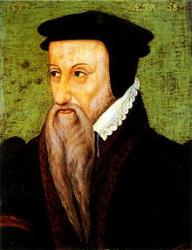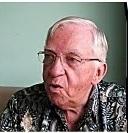
1519 - 1605 Person Name: Théodore de Béze Scripture: Psalm 118:19 Translator (French) of "All People That on Earth Do Dwell (Oh pueblos todos alabad)" in Santo, Santo, Santo Bèze, Théodore de, born at Vezelay, in Burgundy, 1519; died 1605. Bèze’s father was of noble birth. He occupied the post of bailiff at Vezelay. Bèza received a first-rate classical education under Melchior Wolmar. Before he was 20 he wrote some poetry in imitation of Catullus and Ovid, the licentiousness of which he mourned and condemned in alter years. A brilliant prospect of Church emoluments turned his attention from the distasteful study of law. The income of the Priory of Longjumeau made him rich, and he became a prominent member of the literary world at Paris. But his entrance into Orders was barred by a secret marriage with Claudine Denosse. Subsequently, when the offer of the abbey of Froidmont by his uncle made it necessary for him to decide between avowing his marriage and renouncing the prospect, or repudiating his wife, he decided, under the solemn conversion produced by a dangerous illness, to abandon the Roman Church, and break with his whole past life. He left for Geneva (1548), and there publicly married. His first scheme for a living was to join his old comrade Jean Crespin, then at Geneva, in printing; but his appointment to the Professorship of Greek at Lausanne (1549), left the printing office in the hands of Crespin. Before his departure fiom Geneva ho had been on intimate terms with Calvin; and the discovery of a metrical rendering of Ps. 16 on Beza's table at Geneva led Calvin to suggest to him the completion of Marot's Psalms. At Lausanne he became a friend of Viret. He stayed there ten years, during which he wrote a tragi-comedy, and 40 of his metrical Psalms (36 published in 1551, 6 more in 1554). He had whilst at Lausanne a narrow escape from death by the plague. In 1557 he went with Karel and Budams to ask for the intercession of the German Protestant Princes in behalf of the persecuted Hugue-nots, and had interviews with Melanchthon. In 1559 he was appointed pastor at Geneva, Assistant Professor of Theology to Calvin, and the first Rector of the newly founded College of Geneva. With Peter Martyr and others he represented the Huguenots in the conference with the Queen-Mother and Cardinal Lorraine, at Poissy (1561), and remained at Paris nearly two years afterwards. His French metrical Psalter, in continuation of Marot, was completed in 1562. Calvin's death, 1564, left Beza the foremost figure at Geneva. In 1571, at the summons of the King of Navarre, he presided at the Synod of the Reformed Churches at Rochelle; and again (1572) at Nismes. His wife died in 1588, and he married again soon afterwards. His public life, as a theologian, a preacher, and administrator, ceased about 1598, though he preached again for the last time in 1600. He was honoured till his death; only three years before which the Landgrave of Hesse visited him, when passing through Geneva. The works of Beza are very numerous. As a controversialist, a commentator, an investigator of the text of the New Testament, he occupied a high place in his time. Among his chief works are: Annotationes in N. T.., 1556; Novum Testamentum, 1556; Psalms, with paraphrase in Latin, 1579; Life of Calvin, 1563. [Rev. H. Leigh Bennett, M.A.]
-- John Julian, Dictionary of Hymnology (1907)
Théodore de Bèze


 My Starred Hymns
My Starred Hymns





